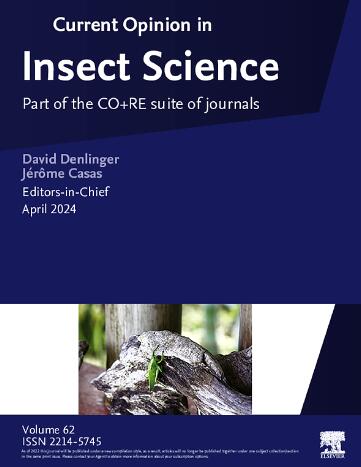Taste adaptations in blood-feeding arthropods: mechanisms and ecological implications
IF 4.8
1区 农林科学
Q1 BIOLOGY
引用次数: 0
Abstract
Hematophagous arthropods rely on taste mechanisms to navigate host selection, feeding, mating, and oviposition. These behaviors are driven by environmental taste cues, which shape acceptance or aversion depending on their valence. Positive stimuli, like low concentrations of salts, sugars, amino acids, and nucleotides, promote feeding and oviposition, while negative stimuli, including high salt, bitter compounds, and nociceptive chemicals, trigger avoidance to prevent hazards. Species-specific adaptations enable blood feeders to overcome ecological challenges. Understanding their behavioral, neuronal, and molecular taste mechanisms aids in developing targeted vector control strategies, such as repellents, toxic baits, and oviposition deterrents, to disrupt disease transmission.
血食性节肢动物的味觉适应:机制和生态学意义。
食血节肢动物依靠味觉机制来选择宿主、进食、交配和产卵。这些行为是由环境味觉线索驱动的,根据它们的效价来形成接受或厌恶。积极刺激,如低浓度的盐、糖、氨基酸和核苷酸,促进摄食和产卵,而消极刺激,包括高盐、苦味化合物和伤害性化学物质,引发回避,以防止危害。特定物种的适应性使吸血动物能够克服生态挑战。了解它们的行为、神经元和分子味觉机制有助于制定有针对性的媒介控制策略,如驱蚊剂、有毒诱饵和产卵威慑剂,以破坏疾病传播。
本文章由计算机程序翻译,如有差异,请以英文原文为准。
求助全文
约1分钟内获得全文
求助全文
来源期刊

Current opinion in insect science
BIOLOGYECOLOGYENTOMOLOGY-ECOLOGY
CiteScore
10.40
自引率
1.90%
发文量
113
期刊介绍:
Current Opinion in Insect Science is a new systematic review journal that aims to provide specialists with a unique and educational platform to keep up–to–date with the expanding volume of information published in the field of Insect Science. As this is such a broad discipline, we have determined themed sections each of which is reviewed once a year.
The following 11 areas are covered by Current Opinion in Insect Science.
-Ecology
-Insect genomics
-Global Change Biology
-Molecular Physiology (Including Immunity)
-Pests and Resistance
-Parasites, Parasitoids and Biological Control
-Behavioural Ecology
-Development and Regulation
-Social Insects
-Neuroscience
-Vectors and Medical and Veterinary Entomology
There is also a section that changes every year to reflect hot topics in the field.
Section Editors, who are major authorities in their area, are appointed by the Editors of the journal. They divide their section into a number of topics, ensuring that the field is comprehensively covered and that all issues of current importance are emphasized. Section Editors commission articles from leading scientists on each topic that they have selected and the commissioned authors write short review articles in which they present recent developments in their subject, emphasizing the aspects that, in their opinion, are most important. In addition, they provide short annotations to the papers that they consider to be most interesting from all those published in their topic over the previous year.
 求助内容:
求助内容: 应助结果提醒方式:
应助结果提醒方式:


